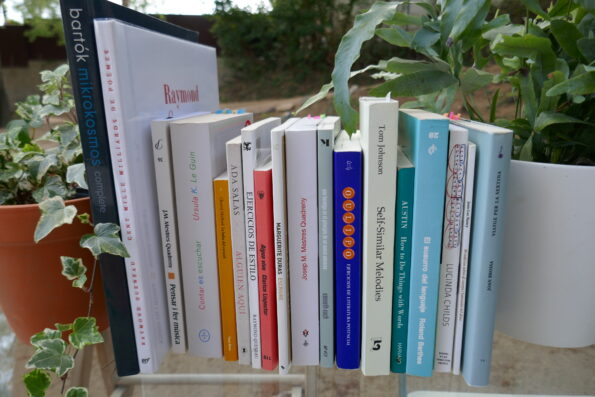Search
To search for an exact match, type the word or phrase you want in quotation marks.
A*DESK has been offering since 2002 contents about criticism and contemporary art. A*DESK has become consolidated thanks to all those who have believed in the project, all those who have followed us, debating, participating and collaborating. Many people have collaborated with A*DESK, and continue to do so. Their efforts, knowledge and belief in the project are what make it grow internationally. At A*DESK we have also generated work for over one hundred professionals in culture, from small collaborations with reviews and classes, to more prolonged and intense collaborations.
At A*DESK we believe in the need for free and universal access to culture and knowledge. We want to carry on being independent, remaining open to more ideas and opinions. If you believe in A*DESK, we need your backing to be able to continue. You can now participate in the project by supporting it. You can choose how much you want to contribute to the project.
You can decide how much you want to bring to the project.

i) Thou shall love your books above all things. Right now, it is Pedro Páramo, Massimo Recalcati and his essays on desire, Gonzalo Maier’s observations on reading and sleeping, a heavily underlined first novel by Clarice Lispector, Anne Carson’s doctoral thesis, and the history of suicide in the West by Ramón Andrés. Spread out on the table like a profane Ouija board, you move them around, as if you were introducing them to each other: Ramón Andrés smiles at the brilliance of Maier, Lispector is frightened by Recalcati’s psychoanalytic theories of desire, and Juan Preciado recites to his mother Carson’s verses of love. They accompany you. You love them.
ii) Thou shall not write in vain. A verse is only a verse when you know why it’s being written and for whom. Do not be afraid of vice, there is always time to erase. Sometimes, one discovers its meaning much later. The word, written days ago, returns in the middle of the night when a bad dream wakes you up. You shall remember it, you shall return and thank it. You shall erase the lines that surround it. You shall start again from the place that has swallowed everything else.
iii) Thou shall bless the texts. You shall let them rest, as you, too, shall rest. You shall forget them and they shall grow in the dark. A text is also written by forgetting. You shall think of it while you walk, when you come home from work, just before you fall sleep. You shall speak to it as you speak to those who are long since gone. You shall try to remember what it looked like, its face, what paths the sentence took, and how the last paragraph ended. Even if you don’t know how to say it, don’t worry. Remember, a text is also written by forgetting. When time has passed, enough time to have missed it, to have invented it again in thought, you shall return. And it shall greet you like no one has ever greeted you before.
iv) Thou shall honor the masters. You shall accept their inheritance. You shall believe, uselessly, that you are on the same level. You shall only write if you think you can speak to those you admire, otherwise you’d be making only insignificant interventions. Believe you are one of them while you write, the time will come to read yourself and discover that the masters are made by History and that the rest are just insignificant interventions. You must believe, though, that you are huge, immense, you must think that behind each word there is mythology and that your texts illuminate the world in a surprising way. Nobody expects you. They also thought the same and now you exist to honor them.
v) Thou shall not be silent, but thou shall keep quiet when the time is right. You shall write when you feel like it because everything else you do at the right time. You shall write and write and write. You shall not be silent. But you shall only do it when you so desire. Afterwards, you shall delete and save documents in isolated folders, you shall change the titles so you can’t find them, and they will become lost in the sad silence of an overcrowded desktop. You shall write and you shall erase, you shall write and erase and erase, you shall write and erase and erase and erase, and so on, until erasing becomes the most intelligent way to write and writing becomes the most elegant way to remain silent.
vi) Thou shall commit impure acts. To write is to lie, deceive, desire, to slack off, to envy, to become enraged, to sleep, swallow, criticize, hate, boast, exceed, bribe, manipulate, discriminate, transgress, kill, deprive, pervert, flatter and disgust. You shall do all of this sitting down, with your mouth closed, and without removing your eyes from a screen in which you shall be more impure than ever. Afterwards, you shall close your computer, you shall go downstairs to make some food, you shall eat quietly, you shall wash the dishes calmly, and you shall take a twenty-minute nap, and then start writing again. You shall have a peaceful life. You shall know when to let go.
vii) Thou shall steal. You shall open one of your beloved books, you shall look for an old underlined phrase or the heart symbol you draw in the margin of your favorite paragraphs. You shall steal the phrase fearlessly. You shall copy it into your manuscript. You shall add to the beginning and the end. You might delete it when you finish, or you might not. Don’t be afraid to leave it there. The most intelligent reader will recognize the reference, they will feel flattered to discover it, they will say that your book has intertextuality, influences and clues. The dumbest reader will say that you plagiarized it. You know, however, that it’s got nothing to do with any of that, that your act is just the simplest and most tender act of love: stealing.
viii) Thou shall give false testimony and thou shall tell lies. You shall invent characters that do not remind you of anyone and you shall describe them using the details of people you love the most. One will have your mother’s nose, the other your father’s pious gaze. There shall be a young man who talks just like your friend, and the cruelty of that secondary character will be the same with which your first love abandoned you. When you write about people you know, you shall do it the other way around. You shall distort the truth, you shall add complexity (let’s face it, we’re boring and of no interest to anyone), you shall add color to the character, deepen the shadows, make them seem titanic, huge, memorable. Perhaps in this way, then, it will have been worth living.
ix) Thou shall harbor impure thoughts and desires. Nothing is ever an error. To err shall be a verb that you shall only conjugate in the conditional: I could err, but no. You shall not regret the places where writing leads you, you shall not stop writing because of the huge monsters that expand your thoughts. You shall remember that writing has also pointed you, when you least expected it, to the most beautiful, brightest places you have ever known. You shall welcome everything that comes and you shall watch it all go, like a neighbor who calls and comes over only to say hello. It shall all enter, pass and go away. Only once in a while will someone come along who you would like to stay for dinner, with whom you would like to spend the night, with whom you could easily fall in love. Don’t forget to invite them in and then close the door behind them so they can’t leave. Cling to that thought as a suicide clings to life, that is, gently but with honor.
x) Thou shall covet the goods of your neighbor, though not too much. Envy kills, as does obsessing with oneself. One must be conservative and seek balance, as much as pride allows. Admire your neighbor, but also reject them. Hate them if you must, but remember that admiration is a resting place. You shall fearlessly admire those you admire. You shall tell them so. You shall tell them that you have underlined their words and have stolen their phrases. You shall tell them that you have tried to copy them without success. You shall ask them how they wrote their books and which authors they have read. You shall read the books they mention and you shall abandon most of them in the middle. You shall understand that each author has their own constellation of texts they treasure and that not all books are for everyone. You shall find your profane Ouija, you shall spread it out on the table, and you shall move the books around, as if you were introducing them to each other. They shall accompany you. You shall love them. They might include Juan Rulfo, Massimo Recalcati, Clarice Lispector and Anne Carson. Or they might include others, who knows. You shall look at them, laid out before you. You shall love them. And they shall love you back. Only then, finally, you shall be able to write. You shall write.

Pol Guasch (Tarragona, 1997) holds an MA in Contemporary Literature, Theory and Culture (King’s College London) and is a pre-doctoral researcher on love and poetics at the University of Barcelona. He has studied on the Independent Studies Programme at MACBA, has taught literature and cultural criticism at the UB and is currently a member of the cultural production company La Sullivan. He is a regular contributor to RAC1, Cadena Ser and Diari Ara. He is the author of the poetry books Tanta gana (Premi Francesc Garriga 2018) and La part del foc (Premi López-Picó 2020), and has recited his verses in South Africa, Switzerland and Germany, among others. He has been awarded several writing grants, such as the Premis Ciutat de Barcelona 2020 Grant, and has been a guest author at international residencies, such as the Santa Maddalena Foundation. Napalm en el corazón (Premi Llibres Anagrama 2021), his first novel, has been translated into several languages, including English, French, German and Italian, among others, and is being adapted for theatre and film. For this novel, he has been awarded the Premi 42 Revelació in Catalan and the Talent on Board Award at the Eñe Festival in Madrid.
Portrait © Francesc Gelonch.
"A desk is a dangerous place from which to watch the world" (John Le Carré)